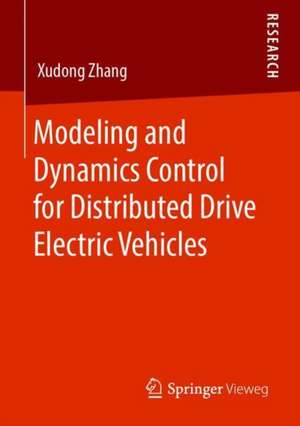Modeling and Dynamics Control for Distributed Drive Electric Vehicles
Autor Xudong Zhangen Limba Engleză Paperback – 9 ian 2021
Preț: 691.76 lei
Preț vechi: 813.83 lei
-15% Nou
Puncte Express: 1038
Preț estimativ în valută:
132.36€ • 138.94$ • 109.87£
132.36€ • 138.94$ • 109.87£
Carte tipărită la comandă
Livrare economică 10-24 aprilie
Preluare comenzi: 021 569.72.76
Specificații
ISBN-13: 9783658322120
ISBN-10: 3658322128
Ilustrații: XVII, 208 p. 117 illus., 104 illus. in color.
Dimensiuni: 148 x 210 mm
Greutate: 0.28 kg
Ediția:1st ed. 2021
Editura: Springer Fachmedien Wiesbaden
Colecția Springer Vieweg
Locul publicării:Wiesbaden, Germany
ISBN-10: 3658322128
Ilustrații: XVII, 208 p. 117 illus., 104 illus. in color.
Dimensiuni: 148 x 210 mm
Greutate: 0.28 kg
Ediția:1st ed. 2021
Editura: Springer Fachmedien Wiesbaden
Colecția Springer Vieweg
Locul publicării:Wiesbaden, Germany
Cuprins
Introduction.- Literature Review.- Distributed Drive Electric Vehicle Model.- Vehicle State and Tire Road Friction Coefficient Estimation.- Direct Yaw Moment Controller Design.- Stability Based Control Allocation Using KKT Global Optimization Algorithm.- Energy Efficient Toque Allocation for Traction and Regenerative Braking.- Simulation and Verification on the Proposed Model and Control Strategy.- Conclusions and Future Work.
Notă biografică
Xudong Zhang received the M.S. degree in mechanical engineering from Beijing Institute of Technology, China, and the Ph.D. degree in mechanical engineering from Technical University of Berlin, Germany. Since 2017, he has joined in Beijing Institute of Technology as an Associate Research Fellow. His main research interests include vehicle dynamics control, autonomous vehicles, and power management of hybrid electric vehicles.
Textul de pe ultima copertă
Due to the improvements on electric motors and motor control technology, alternative vehicle power system layouts have been considered. One of the latest is known as distributed drive electric vehicles (DDEVs), which consist of four motors that are integrated into each drive and can be independently controllable. Such an innovative design provides packaging advantages, including short transmission chain, fast and accurate torque response, and so on. Based on these advantages and features, this book takes stability and energy-saving as cut-in points, and conducts investigations from the aspects of Vehicle State Estimation, Direct Yaw Moment Control (DYC), Control Allocation (CA). Moreover, lots of advanced algorithms, such as general regression neural network, adaptive sliding mode control-based optimization, as well as genetic algorithms, are applied for a better control performance.
About the author
Xudong Zhang received the M.S. degree in mechanical engineering from Beijing Institute of Technology, China, and the Ph.D. degree in mechanical engineering from Technical University of Berlin, Germany. Since 2017, he has joined in Beijing Institute of Technology as an Associate Research Fellow. His main research interests include vehicle dynamics control, autonomous vehicles, and power management of hybrid electric vehicles.
Xudong Zhang received the M.S. degree in mechanical engineering from Beijing Institute of Technology, China, and the Ph.D. degree in mechanical engineering from Technical University of Berlin, Germany. Since 2017, he has joined in Beijing Institute of Technology as an Associate Research Fellow. His main research interests include vehicle dynamics control, autonomous vehicles, and power management of hybrid electric vehicles.
